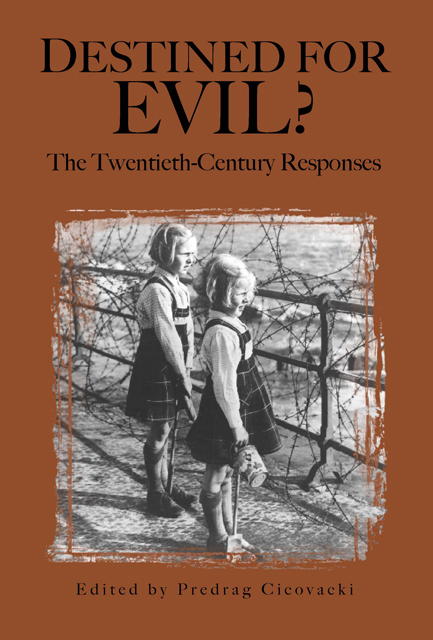Book contents
Introduction: The Anatomy of Evil
Published online by Cambridge University Press: 17 March 2023
Summary
Am I my brother's keeper?
—Genesis, 4:8This collection brings together a variety of responses to the ancient question of whether we are—individually and collectively—destined for evil. The history of the previous century brought this question into the open more poignantly than perhaps any other before. Not surprisingly, then, what you will find here is a wide spectrum of opinions concerning the mystery of evil formulated throughout the twentieth century and at the very threshold of this new one, which inherited all of its open wounds and nightmarish memories. The pieces included here come from diverse fields: philosophy, religious studies, psychology, history, political science, and art; they also assume a variety of forms: essays, treatises, stories, correspondence, and there is even one interview. The reader should not expect that the pieces collected here offer proven recipes of how to eliminate evil from the world; they rather present a compelling testimony of human struggles with an aspect of our lives we cannot afford to ignore.
This first stimulus for this collection came from a symposium on evil, held at the College of the Holy Cross, in Worcester, Massachusetts, on April 11–13, 2002. The symposium was ambitiously called “The Anatomy of Evil,” and in my letter of invitation to the participants I tried to clarify the idea behind organizing such a symposium through the following paragraph:
The twentieth century has cast a dark shadow of doubt over any residual hope that persons of good will might place in the moral progress of the human species. The World Wars, the Nazi concentration camps, the Soviet Gulag, the Chinese “Great Leap Forward,” and many other less spectacular but no less horrific examples of ideological, ethnic, and religious slaughter force us to come to terms with the problem of evil. The killing of tens of millions of innocent people, the literal dehumanization that occurred in the camps, and the possibility of omnicide, i.e., the complete destruction of all life on this planet, demand our reflective self-examination. Where does evil come from? What is the source of the impulses that lead human beings to commit such deeds? How do we respond to evil? What is the role of religion in opposing, or perhaps sometimes inspiring, evil? We must ask the question one so often hears: “Is belief in God still possible after Auschwitz?”
- Type
- Chapter
- Information
- Destined for Evil?The Twentieth-Century Responses, pp. 1 - 16Publisher: Boydell & BrewerPrint publication year: 2005

